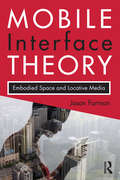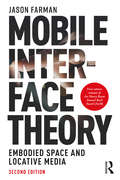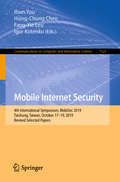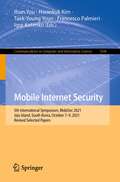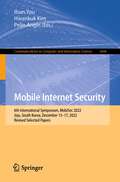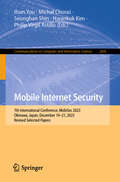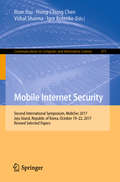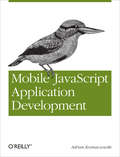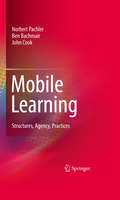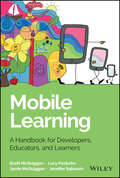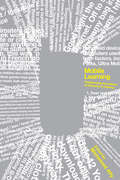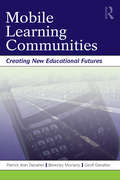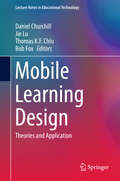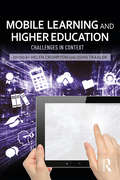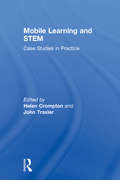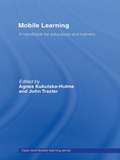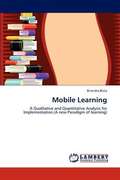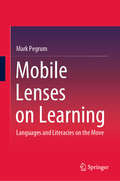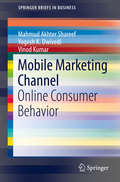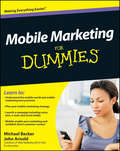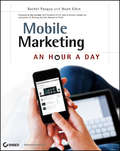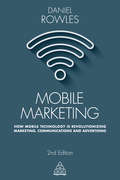- Table View
- List View
Mobile Interface Theory: Embodied Space and Locative Media
by Jason FarmanMobile media – from mobile phones to smartphones to netbooks – are transforming our daily lives. We communicate, we locate, we network, we play, and much more using our mobile devices. In Mobile Interface Theory, Jason Farman demonstrates how the worldwide adoption of mobile technologies is causing a reexamination of the core ideas about what it means to live our everyday lives. He argues that mobile media’s pervasive computing model, which allows users to connect and interact with the internet while moving across a wide variety of locations, has produced a new sense of self among users – a new embodied identity that stems from virtual space and material space regularly enhancing, cooperating or disrupting each other. Exploring a range of mobile media practices – including mobile maps and GPS technologies, location-aware social networks, urban and alternate reality games that use mobile devices, performance art, and storytelling projects – Farman illustrates how mobile technologies are changing the ways we produce lived, embodied spaces.
Mobile Interface Theory: Embodied Space and Locative Media
by Jason FarmanIn this updated second edition, Jason Farman offers a groundbreaking look at how location-aware mobile technologies are radically shifting our sense of identity, community, and place-making practices. Mobile Interface Theory is a foundational book in mobile media studies, with the first edition winning the Book of the Year Award from the Association of Internet Researchers. It explores a range of mobile media practices from interface design to maps, AR/VR, mobile games, performances that use mobile devices, and mobile storytelling projects. Throughout, Farman provides readers with a rich theoretical framework to understand the ever-transforming landscape of mobile media and how they shape our bodily practices in the spaces we move through. This fully updated second edition features updated examples throughout, reflecting the shifts in mobile technology. This is the ideal text for those studying mobile media, social media, digital media, and mobile storytelling.
Mobile Internet Security: 4th International Symposium, MobiSec 2019, Taichung, Taiwan, October 17–19, 2019, Revised Selected Papers (Communications in Computer and Information Science #1121)
by Ilsun You Igor Kotenko Fang-Yie Leu Hsing-Chung ChenThis book constitutes the refereed proceedings of the 4th International Symposium on Mobile Internet Security, MobiSec 2019, held in Taichung, Taiwan, in October 2019.The 13 revised full papers presented were carefully reviewed and selected from 44 submissions. The papers are organized in the topical sections: mobile internet security; mobile application and security; vehicular network security; deep learning applications.
Mobile Internet Security: 5th International Symposium, MobiSec 2021, Jeju Island, South Korea, October 7–9, 2021, Revised Selected Papers (Communications in Computer and Information Science #1544)
by Ilsun You Francesco Palmieri Igor Kotenko Hwankuk Kim Taek-Young YounThis book constitutes the refereed proceedings of the 5th International Symposium on Mobile Internet Security, MobiSec 2021, held in Jeju Island, Republic of Korea, in October 2021.The 28 revised full papers presented were carefully reviewed and selected from 66 submissions. The papers are organized in the topical sections: IoT and cyber security; blockchain security; digital forensic and malware analysis; 5G virtual Infrastructure, cryptography and network security.
Mobile Internet Security: 6th International Symposium, MobiSec 2022, Jeju, South Korea, December 15–17, 2022, Revised Selected Papers (Communications in Computer and Information Science #1644)
by Ilsun You Hwankuk Kim Pelin AnginThis book constitutes the refereed proceedings of the 6th International Conference on Mobile Internet Security, MobiSec 2022, held in Jeju, South Korea, in December 15–17, 2022.The 24 full papers included in this book were carefully reviewed and selected from 60 submissions. They were organized in topical sections as follows: 5G advanced and 6G security; AI for security; cryptography and data security; cyber security; and IoT application and blockchain security.
Mobile Internet Security: 7th International Conference, MobiSec 2023, Okinawa, Japan, December 19–21, 2023, Revised Selected Papers (Communications in Computer and Information Science #2095)
by Ilsun You Michał Choraś Hwankuk Kim Seonghan Shin Philip Virgil AstilloThis book constitutes the refereed post-proceedings of the 7th International Conference on Mobile Internet Security, MobiSec 2023, held in Okinawa, Japan, in December 19–21, 2023. The 21 full papers presented were carefully reviewed and selected from 70 submissions. The papers are organized in the following topical sections: 5G and 6G security; cryptography; machine learning-based security; identification and authentication; network design and security.
Mobile Internet Security: First International Symposium, Mobisec 2016, Taichung, Taiwan, July 14-15, 2016, Revised Selected Papers (Communications in Computer and Information Science #797)
by Ilsun You Vishal Sharma Igor Kotenko Hsing-Chung ChenThis book constitutes the refereed proceedings of the First International Symposium on Mobile Internet Security, MobiSec 2017, held in Jeju Island, Republic of Korea, in October 2017. <P><P>The 13 revised full papers along with a short paper presented were carefully reviewed and selected from 44 submissions. They are closely related to various theories and practical applications in mobility management to highlight the state-of-the-art research.
Mobile JavaScript Application Development: Bringing Web Programming to Mobile Devices
by Adrian KosmaczewskiWhen developing apps for the latest smartphones, you’re faced with several vexing questions. How many platforms do you need to accommodate? What level of support do mobile browsers provide? To help you address these and many other key issues, this guide provides a hands-on tour of the most powerful JavaScript frameworks available today.You’ll build sample apps with jQuery Mobile, Sencha Touch, and PhoneGap to learn the unique advantages—and disadvantages—of each framework. From there, you can determine which one is best for your project. This book is ideal for web developers familiar with JavaScript, HTML, and CSS.Experience the simplicity of jQuery Mobile for building cross-browser applicationsLearn how Sencha Touch’s architecture, widgets, and blazing-fast rendering engine makes it a good choice for enterprise softwareUse PhoneGap to package your web app into a native iOS, Android, or Windows Phone applicationDiscover the impact of various HTML5 features on mobile app developmentPick up JavaScript productivity tips as you delve into its object orientation, closures, and coding conventionsTest and debug your app with a collection of tips, tricks, and tools
Mobile Learning
by Gunther Kress Norbert Pachler Ben Bachmair John CookAs with television and computers before it, today's mobile technology challenges educators to respond and ensure their work is relevant to students. What's changed is that this portable, cross-contextual way of engaging with the world is driving a more proactive approach to learning on the part of young people. The first full-length authored treatment of the relationship between the centrality of technological development in daily life and its potential as a means of education, Mobile Learning charts the rapid emergence of new forms of mass communication and their potential for gathering, shaping, and analyzing information, studying their transformative capability and learning potential in the contexts of school and socio-cultural change. The focus is on mobile/cell phones, PDAs, and to a lesser extent gaming devices and music players, not as "the next new thing" but meaningfully integrated into education, without objectifying the devices or technology itself. And the book fully grounds readers by offering theoretical and conceptual models, an analytical framework for understanding the issues, recommendations for specialized resources, and practical examples of mobile learning in formal as well as informal educational settings, particularly with at-risk students. Among the topics covered: * Core issues in mobile learning * Mobile devices as educational resources * Socioeconomic approaches to mobile learning * Creating situations that promote mobile learning * Ubiquitous mobility and its implications for pedagogy * Bridging the digital divide at the policy level Mobile Learning is a groundbreaking volume, sure to stimulate both discussion and innovation among educational professionals interested in technology in the context of teaching and learning.
Mobile Learning
by Jamie Mcquiggan Lucy Kosturko Jennifer Sabourin Scott McquigganExplore the game-changing technology that allows mobile learning to effectively reach K-12 students Mobile Learning: A Handbook for Developers, Educators and Learners provides research-based foundations for developing, evaluating, and integrating effective mobile learning pedagogy. Twenty-first century students require twenty-first century technology, and mobile devices provide new and effective ways to educate children. But with new technologies come new challenges--therefore, this handbook presents a comprehensive look at mobile learning by synthesizing relevant theories and drawing practical conclusions for developers, educators, and students. Mobile devices--in ways that the laptop, the personal computer, and netbook computers have not--present the opportunity to make learning more engaging, interactive, and available in both traditional classroom settings and informal learning environments. From theory to practice, Mobile Learning explores how mobile devices are different than their technological predecessors, makes the case for developers, teachers, and parents to invest in the technology, and illustrates the many ways in which it is innovative, exciting, and effective in educating K-12 students. Explores how mobile devices can support the needs of students Provides examples, screenshots, graphics, and visualizations to enhance the material presented in the book Provides developers with the background necessary to create the apps their audience requires Presents the case for mobile learning in and out of classrooms as early as preschool Discusses how mobile learning enables better educational opportunities for the visually impaired, students with Autism, and adult learners. If you're a school administrator, teacher, app developer, or parent, this topical book provides a theoretical, well-researched discussion of the pedagogical theory and mobile learning, as well as practical advice in setting up a mobile learning strategy.
Mobile Learning Communities: Creating New Educational Futures
by Geoff Danaher Patrick Alan Danaher Beverley MoriartyMobile Learning Communities explores the diverse ways in which traveling groups experience learning ‘on the run’. This book provides empirical evidence that draws on the authors’ 17 years of continuing research with international occupational Travelers. It engages with themes such as workplace learning, globalization, multiliteracies, and emerging technologies which impinge on the ways mobile groups make sense of themselves as learning communities. International in focus, this book deals with an issue of increasing global significance and shows the complexities of the lives and learning experiences of such mobile cultures and their strategies for earning, learning, and living, thus challenging simplistic and stereotypical images of traveling groups still found in mainstream media and popular culture. Mobile Learning Communities brings together for the first time mobilities and learning communities into a single and comprehensive focus. It provides a detailed analysis of how mobile groups position themselves and how they are positioned by others. This text will appeal to scholars in the field of distance education and educational technology and to researchers in education, cultural studies, and sociology. It will also be of interest to educational instructors, policy-makers, and administrators, as well as teacher educators and pre-service teachers. It paints a vivid picture of the experience of mobility through the words of the mobile learners themselves, but also critiques existing notions of learning and suggests ways of creating new educational futures for all learners and educators.
Mobile Learning Design
by Bob Fox Daniel Churchill Jie Lu Thomas K.F. ChiuThis book focuses on mobile learning design from both theoretical and practical perspectives. It introduces and discusses how mobile learning can be effectively integrated into curricula, highlighting the design of four key components of learning-centric pedagogy: Resource, Activity, Support and Evaluation in the context of mobile learning. It also investigates the learning theories underpinning mobile learning design, and includes case studies in different contexts. It provides practical insights that allow teachers to change and transform teaching practices using mobile technology. Anyone involved in mobile-technology enhanced learning and teaching will find this book both informative and useful.
Mobile Learning and Higher Education: Challenges in Context
by Helen Crompton John TraxlerMobile Learning and Higher Education provides case studies of mobile learning in higher education settings to showcase how devices can transform learning at the undergraduate and graduate levels. With the rapid diffusion of networked technologies among the adult populations of many countries and the supersession of the once-ubiquitous lecture approach with active learner-centered teaching for deep understanding, mobile devices are increasingly used in higher education classrooms to offer unique and effective new approaches to teaching and learning. A cutting-edge research volume, this collection also provides a springboard for building better practices in higher education institutions.
Mobile Learning and STEM: Case Studies in Practice
by Helen Crompton John TraxlerIn recent years, there has been a renewed focus on STEM education in the United States, fueled by evidence that young learners’ competencies in science, technology, engineering, and mathematics are falling behind those of their global peers. Scholars and practitioners are beginning to utilize the new pedagogical opportunities offered by mobile learning to improve the successes of teachers and K-12 students across STEM subjects. Mobile Learning and STEM: Case Studies in Practice is a comprehensive collection of case studies that explore mobile learning’s support of STEM subjects and that utilize mobile technology to facilitate unique and effective K-12 teaching and learning experiences. In addition to its focus on STEM achievement for researchers, this volume is a resource for teachers working to implement mobile learning initiatives into their classrooms. Mobile Learning and STEM also includes research that is applicable to classrooms in nations around the world, where few students from underrepresented racial and socioeconomic backgrounds are entering into STEM jobs. Concluding with a summary of its research and its implications to future scholarship and practice, this book is a springboard for practitioners, specialists, higher education instructors, and researchers who want to establish better practices in schools and raise student achievement in STEM subjects.
Mobile Learning for All: Supporting Accessibility With the iPad
by Luis PérezThis book provides practical information for teachers and other educational professionals who want to learn how to use the iPad to meet the needs of all learners.
Mobile Learning: A Handbook for Educators and Trainers (Open And Flexible Learning Ser.)
by Agnes Kukulska-Hulme John TraxlerEmphasising the issues of usability, accessibility, evaluation and effectiveness and illustrated by case studies drawn from contemporary projects from around the world, this book considers: the fundamentals of mobile technologies and devices the educational foundations of modern networked learning the issues that underpin mobile learning and make it accessible for all users the challenges of making mobile learning a substantial and sustainable component in colleges, universities and corporations implications and issues for the future. Mobile Learning provides useful, authoritative and comprehensive guidance for professionals in higher and further education and trainers in the business sector who want to find out about the opportunities offered by new technologies to deliver, support and enhance teaching, learning and training.
Mobile Learning: A Qualitative and Quantitative Analysis for Implementation
by Birendra BistaA dissertation by Birendra Bista on mobile learning, a new paradigm in e-learning.
Mobile Lenses on Learning: Languages and Literacies on the Move
by Mark PegrumThis book explores mobile learning as a form of learning particularly suited to our ever more mobile world, presenting a new conceptualisation of the value of mobile devices in education through the metaphor of lenses on learning. With a principal focus on mobile-assisted language learning (MALL), it draws on insights derived from MALL language, literacy and cultural projects to illustrate the possibilities inherent in all mobile learning.In its broad sweep the book takes in new and emerging technologies and tools from robots to holograms, virtual reality to augmented reality, and smart glasses to embeddable chips, considering their potential impact on education and, indeed, on human society and the planet as a whole. While not shying away from discussing the risks, it demonstrates that, handled appropriately, mobile, context-aware technologies allow educators to build on the personalised and collaborative learning facilitated by web 2.0 and social media, but simultaneously to go much further in promoting authentic learning experiences grounded in real-world encounters. In this way, teachers can better prepare students to face a global, mobile future, with all of its evolving possibilities and challenges.
Mobile Marketing
by Daniel RowlesHaving become the ultimate social device, and as users drift away from TVs and computer screens, the mobile offers radical new challenges for the marketer. But how do you design and implement an effective digital strategy? And what tools can be used to measure marketing effectiveness?Starting with a review of the technology itself - both hardware and software - Mobile Marketing explains the dynamics between the key players and how these forces are shaping future developments in terms of service provision, media integration and content strategy. Supported by in-depth case studies, which illustrate the potential pitfalls and rewards of mobile marketing initiatives, Mobile Marketing shows how our new mobile lifestyle can be a rewarding environment for those businesses willing to embrace new technology and, with imagination and creativity, develop mobile marketing strategies that can win customers, boost brand awareness, raise profile and increase profits.
Mobile Marketing Channel
by Yogesh K. Dwivedi Mahmud Akhter Shareef Vinod KumarThis book attempts to address, explore, and conceptualize the epistemological paradigms of SMS as an alternative marketing channel or in combination with other existing traditional channels. It promotes a multichannel strategy in the light of synthesized marketing distribution, consumer behavior, and information and communication technology (ICT)-related behavioral theory to develop, establish, and launch a guiding theory and practice for this emerging area. Usage of mobile phones and hand-held wireless devices is growing and diffusing so quickly that 21st century marketing managers find a great potential for this wireless channel to be the most effective media for maintaining a consumer relationship that provides the highest quality service. The emergence of SMS-based direct marketing as a distinct channel or embedded with other channels is characterized by several issues, challenges, barriers, and limitations. This book examines and postulates the following interrelated issues related to wireless marketing (particularly the SMS-based marketing channel): (i) Consumer behavior for mobile phone SMS - perception, exposure, and attention; (ii) Consumer attitudes toward SMS-based marketing channels; (iii) The scope of SMS to meet consumer service output demands from an online channel; (iv) Consumer selection criteria for mobile phone SMS channel structure; (v) Mobile channel structure as an efficient and effective consumer interaction mode; and (vi) Consumer multichannel behavior. It is important to use the SMS-based mobile channel as a radical tool of interactive marketing and seamless service marketing, as there is the opportunity to maximize, u ntil now, unutilized benefits of this efficient and popular direct marketing channel.
Mobile Marketing For Dummies
by John Arnold Michael BeckerStraightforward advice on building and launching a mobile marketing plan Mobile communication is hot, and so is marketing on mobile devices. Mobile Marketing For Dummies provides a clear and easy path for creating, launching, and making the most of a mobile marketing program. Designed for marketing professionals and other business people who may have little experience with the medium, it explains mobile marketing and how to convert a traditional marketing plan to mobile. Topics include assembling resources and budget, creating a plan, following best practices, building mobile sites, and much more. Explains what mobile marketing is, how you can adapt a traditional marketing plan for mobile, and how to create and launch a mobile marketing plan from scratch Covers activating a plan using voice, text, e-mail, and social media campaigns Explores the nuts and bolts of building mobile sites, apps, monetizing mobile, and advertising on other mobile properties Mobile Marketing For Dummies gives you the tools to succeed in this exciting environment.
Mobile Marketing In A Week: Build The Ultimate Mobile Marketing System In Seven Simple Steps
by Nick SmithUnderstand mobile marketing fast, without cutting cornersAn understanding of mobile marketing is essential for anyone who wants to reach the growing market of on-the-go consumers. In this short, accessible book, Nick Smith shares a lifetime of hard-earned wisdom and practical advice, giving you, in straightforward language, all the mobile marketing expertise you need to run successful mobile campaigns. The 'in a week' structure explains the essentials of mobile marketing over just 7 days:Sunday: Why the future is mobileMonday: Basic mobile traffic getting tacticsTuesday: Social mobile marketingWednesday: Mobile pay per click (PPC) marketingThursday: Mobile apps for SMEsFriday: SMS marketingSaturday: Building the ultimate mobile marketing systemAt the end there are questions to ensure you have taken it all in and cartoons, diagrams and visual aids throughout help make Mobile Marketing In A Week an enjoyable and effective learning experience.So what are you waiting for? Take the fast track to successful mobile marketing!
Mobile Marketing: An Hour a Day
by Rachel Pasqua Noah ElkinA step-by-step guide to successful mobile marketing strategies Go from zero to sixty with this practical book that helps you craft and deploy mobile marketing strategies for everything from brand building to lead generation and sales. As part of the popular do-it-yourself, Hour A Day series, this new book is full of advice, practical tips, and step-by-step tactics you can put to use right away. Start leveraging location-based marketing via Foursquare and Yelp, see how to set up and manage mobile commerce, and try such technologies as QR codes, ambient communication (RFID and Bluetooth), mobile broadcasting, and more. Take action now and mobile-loving customers will soon find you, thanks to these successful ideas and strategies from expert mobile marketers, Rachel Pasqua and Noah Elkin. Shows you step by step how to develop, implement, and measure a successful mobile marketing strategy Pares down a complex process into approachable, bite-sized tasks you can tackle in an hour a day Covers vital mobile marketing weapons like messaging, mobile websites, apps, and mobile advertising to help you achieve your goals Gets you up to speed on location-based marketing via Foursquare and Yelp, using mobile commerce, and leveraging technologies such as as QR codes, ambient communication (RFID and Bluetooth), and mobile broadcasting Mobile Marketing: An Hour A Day is a must-have resource for marketers and advertisers who want a compelling mobile presence.
Mobile Marketing: How Mobile Technology is Revolutionizing Marketing, Communications and Advertising
by Daniel RowlesMobile Marketing is a clear, practical guide to harnessing the mobile consumer and tackling the rising challenges of divided user attention across multiple screens at the same time. It demystifies the vast spectrum of tools and techniques now available and explains how to optimize these dynamics into an innovative and effective mobile marketing strategy. Now that website search rankings take into account mobile optimization, no serious marketer can do without a thorough understanding of mobile.The first edition of Mobile Marketing won the Judge's Choice Award in Social Media at the Small Business Trend's 2014 Book Awards. This fully revised 2nd edition includes straightforward explanations on mobile optimized content, app development, social media and proximity based marketing. It has also expanded to include two brand new chapters on mobile and email and on location-based devices, plus cutting-edge updates on advances in wearable technology, mobile payments, virtual reality and strategies for the changing user journey. Integrated with tactical checklists, easy application frameworks and powerful case study insights such as Heineken, WordPress, MailChimp, Nike Training Club (NTC), Google Play and Moz, if provides a full overview from service provision and technology integration to content strategy, ready to capture fast-moving consumers on the go.
